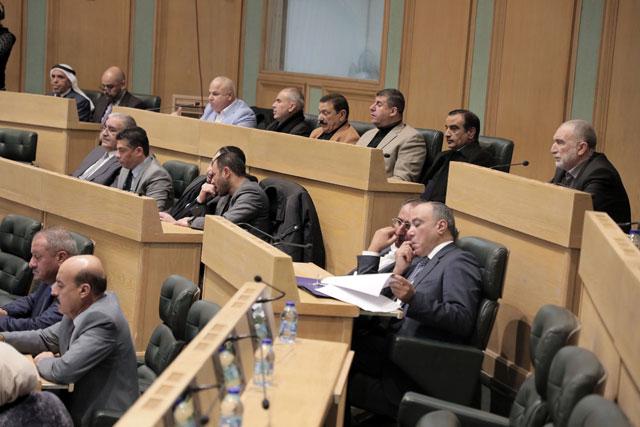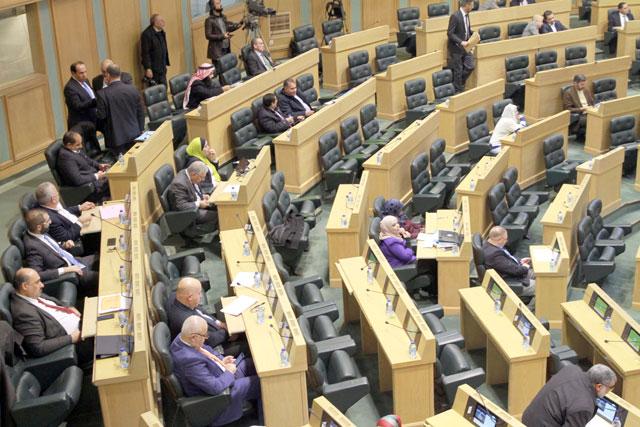You are here
MPs start debate of draft budget bill
By JT - Dec 30,2018 - Last updated at Dec 31,2018

The Lower House begins its deliberations on the draft 2019 state budget law on Sunday (Photo courtesy of Osama Aqarbeh)
AMMAN — The Lower House on Sunday began its deliberations over the draft 2019 state budget law and the budgets of independent public institutions.
The session was opened by a presentation of the House’s Financial Committee’s notes on the 2019 budget law, in addition to the bill governing the budget of independent state agencies, the Jordan News Agency, Petra, reported.
The committee recommended that the government shift from “money-collecting policies” to a budget of development and growth. The committee’s president, MP Khaled Bakkar, said that the 2016 draft budget bills “would not achieve the targeted growth”, Petra reported.
Bakkar also said that the panel has linked its approval of the draft bills to the government’s submission of mega investment projects to be financed outside the budget through the build-operate-transfer or the financial leasing contracts, according to Petra.
The MP said that the committee also requested that the government finances solar panel projects for limited-income families, that would enable them to obtain 300 megawatts of free electricity.
The panel’s rapporteur, MP Auglah Zboun, said that they submitted a set of recommendations to the government on how to achieve growth and improve citizens’ living conditions, including activating partnerships between the public and private sectors and increasing the minimum wage in line with inflation rates, Petra reported.
He said that the committee also recommended that the government stick to the allocations in the draft budgets laws, and work more towards improving the investment climate through decreasing production costs and utilising natural resources to set up specialised industries.
Regarding supporting the agricultural sector, the panel recommended opening new markets for the agricultural products.
The report also covered reducing the cost of water through relying on renewable energy to provide the Water Ministry with electricity. It also included providing support for the national project of e-billing system and tackled giving more support for the armed forces and security agencies in order to boost its competency and preparedness.
Twelve MPs took to the podium on Sunday to present their notes on the two bills. The Chamber decided to give each parliamentary bloc 15 minutes and each individual MP 10 minutes to present their notes on the budget laws.
Early this month, the government presented, to the House, the 2019 state budget draft law, estimating the budget deficit at JD646 million after foreign grants that constitute 2 per cent of the GDP, down from 2.7 in 2018.
The deficit in the 2018 budget is expected to amount to 2.7 per cent of GDP by year end, compared with 2.6 per cent in 2017, while the total public debt is expected to total around JD28.4 billion by the end of 2018, constituting 94.5 per cent of GDP.
The draft law included allocations for a number of projects, such as the national service programme, projects to create employment opportunities for Jordanians, supporting public schools’ transportation, support for urban transport projects, promoting exports, tourism projects and the e-government.
According to the 2019 state budget draft law, GDP is expected to increase by 2.3 per cent, 2.5 per cent and 2.7 per cent in 2019, 2020 and 2021 respectively.
The state budget statement submitted to the House estimated the volume of local revenue in 2019 to reach JD8.01 billion with an increase of 14.8 per cent from 2018, with the reason primarily attributed to the rise in tax and non-tax revenues by 15.9 per cent and 12.9 per cent, respectively.
Tax revenues are estimated for the entirety of 2019 at JD5.273 billion, of which income tax revenue would constitute JD3.61 billion, customs revenue JD365 million, property sale tax JD110 million, while non-tax revenues are estimated at JD2.737 billion.
Related Articles
AMMAN — The Senate on Sunday endorsed the 2019 state budget bill and the draft law governing the budgets of independent public institutions,
AMMAN — The Senate’s Finance and Economy Committee, headed by Senator Umayya Toukan, on Sunday passed the 2019 state and independent public
AMMAN — The Lower House is expected to vote on the 2019 state budget draft law and the budgets of independent public institut












